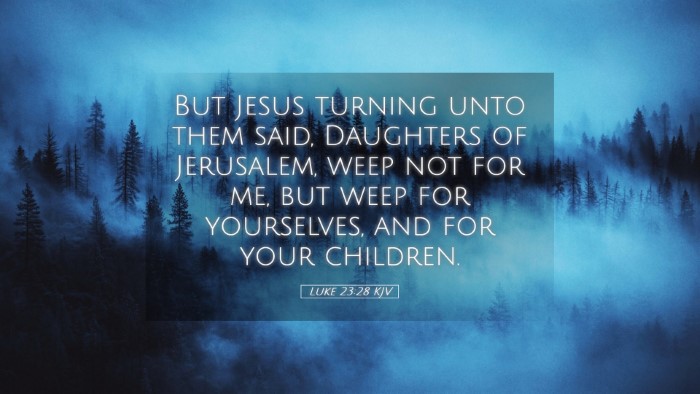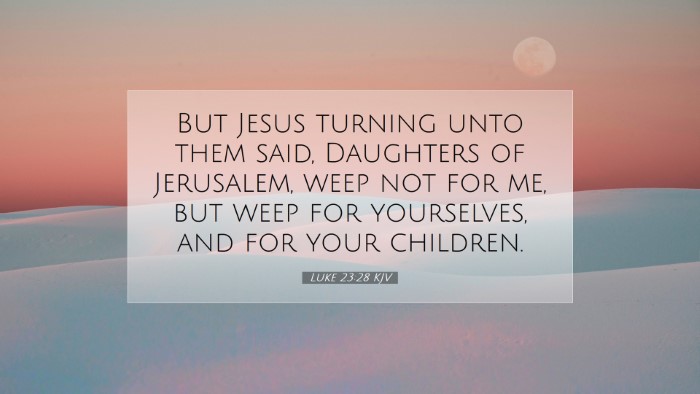Commentary on Luke 23:28
Verse Contextualization: Luke 23:28 reads: “But Jesus turning unto them said, Daughters of Jerusalem, weep not for me, but weep for yourselves, and for your children.” This poignant moment occurs as Jesus is being led to His crucifixion, a moment filled with both sorrow and profound theological significance.
General Observations
This statement is one of the final teachings of Jesus before His death. It reflects His profound empathy and the depth of His understanding of the impending destruction that Jerusalem would face. The verse serves as a powerful reminder of Jesus’ mission and His awareness of the future suffering of the people, especially the women of Jerusalem who were lamenting for Him.
Historical and Cultural Context
The “Daughters of Jerusalem” were likely a group of women from Jerusalem who were mourning for Jesus as He carried His cross. In the cultural context of the time, mourning was often a communal activity, and women often took on the role of lamenters. This cultural expectation adds layers to Jesus’ response.
Insights from Matthew Henry
Matthew Henry highlights the deep compassion of Jesus even in His own suffering. He emphasizes that Jesus, rather than seeking pity for Himself, redirects the mourning of the women towards a sense of impending judgment. Henry posits that Jesus, fully aware of the coming destruction of Jerusalem, urges the people to recognize their need for repentance and to mourn not merely for Him, but for their own spiritual state.
- Compassion Over Self-Pity: Henry remarks that Jesus' instruction to not weep for Him displays His selflessness and focus on eternal truths rather than temporal suffering.
- Forewarning of Judgment: The lament for Him is countered with a call to recognize their circumstances. Henry sees this as a prophetic commentary on the fate of Jerusalem, foreshadowing the destruction that would soon come in 70 A.D.
- Spiritual Reflection: His call for the women to weep for themselves and their children underscores the necessity for self-examination and the condition of one’s heart before God.
Insights from Albert Barnes
Albert Barnes provides a theological perspective on this verse, noting the contrast between the physical suffering of Jesus and the spiritual malaise of the nation. His observations include:
- The Call to Authentic Mourning: Barnes interprets Jesus’ words as a directive towards authentic repentance and recognition of sin. He emphasizes that true mourning should stem from a realization of one’s own sinfulness and the consequences that follow.
- Covenantal Consequences: Barnes points out that Jesus’ appeal to the women is rooted in the historical covenant relationship between God and Israel, warning of the consequences of disobedience.
- Universal Application: The plea for the women to weep for themselves resonates beyond the immediate historical context, calling all believers through the ages to recognize their spiritual plight and the necessity of turning to Christ.
Insights from Adam Clarke
Adam Clarke’s commentary places an emphasis on the prophetic aspect of Jesus’ statement. Clarke observes that the tears being shed for Jesus should instead signify the tears of repentance for the nation’s rejection of Him.
- Prophetic Insight: Clarke highlights that Jesus’ words are not just a reflection of His sorrow but a prophetic word regarding the coming tribulations that would lead to the suffering of many in Jerusalem.
- Emotional Resonance: He comments on the emotional weight of the moment, where Jesus, despite His pain, shows care for those who mourn rather than allowing them to indulge in misplaced sorrow.
- Symbolic Interpretation: Clarke interprets the understanding of ‘children’ as a symbol of future generations, emphasizing the responsibility of the current generation to instill faith and righteousness in their offspring.
Theological Reflections
The theological implications of this verse are profound. It reveals Jesus’ understanding of His role as more than just a martyr; He is the prophetic voice calling for repentance. The emotional depth of His words invites believers to consider their own condition before God. There are several key reflections that can be drawn:
- Repentance Over Remorse: The need for true repentance is emphasized; countless individuals may feel sorrow over Christ’s suffering, yet the call is towards personal reflection and acknowledgment of sin.
- Hope amid Despair: Even amid a grim prediction, Jesus reminds the women—and us—that despair can lead to repentance, which in turn leads to hope and restoration through Him.
- Compassion in Suffering: Jesus exemplifies the ultimate compassion, inviting the attention of mourners away from His suffering, to their need for forgiveness and reconciliation with God.
Application for Pastors and Theologians
For pastors, preachers, and theologians, Luke 23:28 serves as a vital text for preaching on themes of repentance and the compassion of Christ. It encourages a pastoral response that leads congregations to deeper reflection on their own lives in light of Christ's suffering. In crafting sermons, consider these approaches:
- Calling for Repentance: Use this text to expound on the importance of recognizing personal sin and encourage congregational accountability.
- Teaching on Compassion: Highlight the need for compassion towards others in distress, as modeled by Christ, encouraging congregants to reflect how they can respond to suffering in their communities.
- Exploring Historical Context: Delve into the historical backstory of Jerusalem’s destruction as a call to heed Christ's warnings seriously, making the application relevant to contemporary society.
Conclusion
Luke 23:28 is a profound verse that encapsulates a pivotal moment in the passion narrative of Christ. The insights provided by Matthew Henry, Albert Barnes, and Adam Clarke collectively enrich our understanding of Jesus' words, reminding us to weep not just for Him, but for ourselves and for the state of our relationship with God. Their reflections prompt us to consider the gravity of sin, the urgency of repentance, and the everlasting compassion of Christ. In this, we find not only a reflection of sorrow but also a clear path towards hope, redemption, and restoration.


